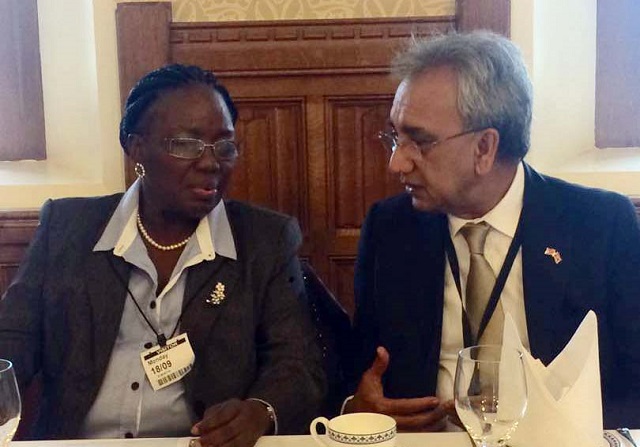
Kampala, Uganda | GODFREY SSALI | Investors from the United Kingdom face frustration due to bureaucracy and corruption as they seek to start up business in Uganda.
This was revealed by Lord Dolar Popat from the House of Lords while hosting the Speaker of Parliament Rebecca Kadaga to a dinner in London, Monday 18th September 2017.
Lord Popat was born in Uganda but left the country in 1971 before the expulsion of Asians by Idi Amin. He is currently the British Prime Minister’s trade envoy for Rwanda and Uganda following his appointment in January 2016.
Lord Popat said that Africa is endowed with all the natural resources in the world and the British investors are keen to focus more in the areas of trade and investment. He however, expressed concern with the slow pace of doing business in Uganda.
“The only way we can create employment for the 70,000 graduates every year is through trade and investment. However, things in Uganda are still tough and people get frustrated and leave,” he said.
He cited an example of Rwanda that exploited the gap of the air route to London and started flights between Kigali and the UK following the exit of British Airways.
“When I met President Kagame and told him about this availability, in a few weeks, they bought two planes which are now flying this route. In Uganda, we have been talking of an airline for years. We have a problem; things get delayed,” he added.
The Speaker said that she would take up the issue with the responsible ministries and address the problems that investors face in trying to start business in Uganda acknowledging that bureaucracy and corruption has to be tackled head-on.
“I met two investors at the Uganda-UK Convention who have been trying to get into Uganda for 10 years but have been frustrated. We shall see how to work on these matters,” Kadaga said.
Kadaga added that Uganda is interested in more investment that would create employment and not let the country continue being a market for imported products.
She however, called for fairness in the investment regime especially when it comes to the contracts that the foreign companies sign.
“On top of employing persons from their countries of origin, they decide to import everything and not buy any local products. How can a company like Tullow Oil import beef and tomatoes from Brazil and South Africa respectively,” she wondered.
The Speaker asked Lord Popat to urge the British government to ease the process of securing visas to the UK citing the high costs and long processing times.
“The cost has risen to over 200 pounds whether you get the visa or not. The conditions are not fair. We need equity. If you reject the application, refund the money,” she said adding that ‘when you apply for the visa, you have to wait for your passport for over a month making you a prisoner in your own country.’
Lord Popat said that he will push for a 48-hour turn around for business visas like has been done for Rwanda.
Earlier in the day, the Speaker attended the 4th Teso Development International Conference at the University of East London.
Kadaga called for the revival of good systems of food security and storage as it was in the past.
“Issues of food security and storage are things we need to go back to. We need to marry the existing systems and the traditional methods for this cause,” Kadaga said.
The Speaker, while responding to a request for land in Soroti that the Iteso diaspora intend to build a teaching hospital said that she will call for a meeting of all stakeholders ‘to conclude on land for the university teaching hospital.’
 The Independent Uganda: You get the Truth we Pay the Price
The Independent Uganda: You get the Truth we Pay the Price


